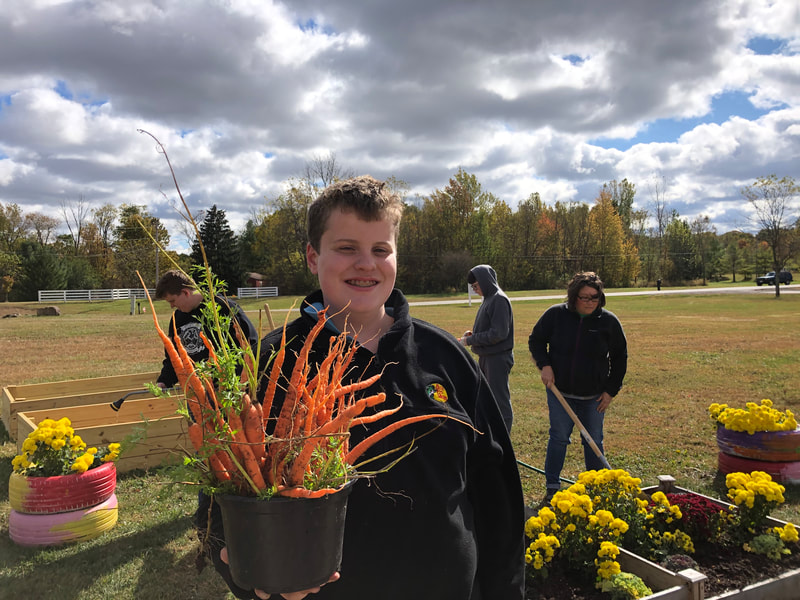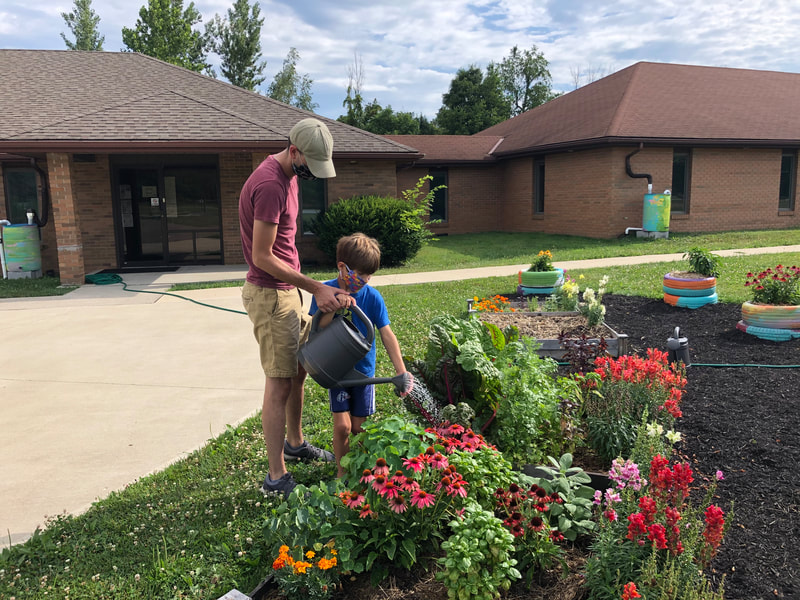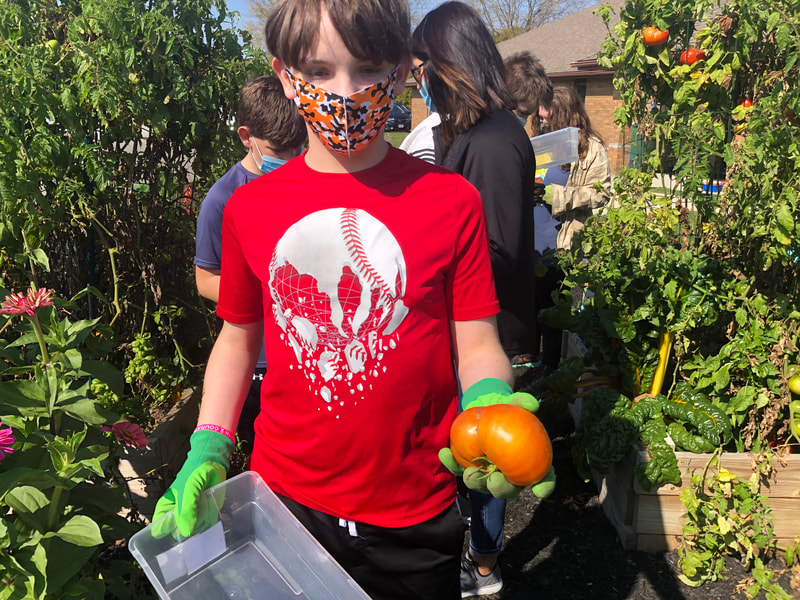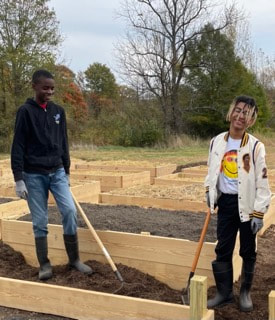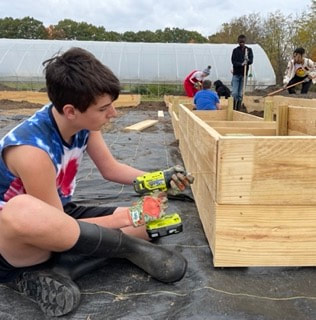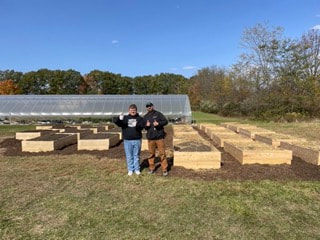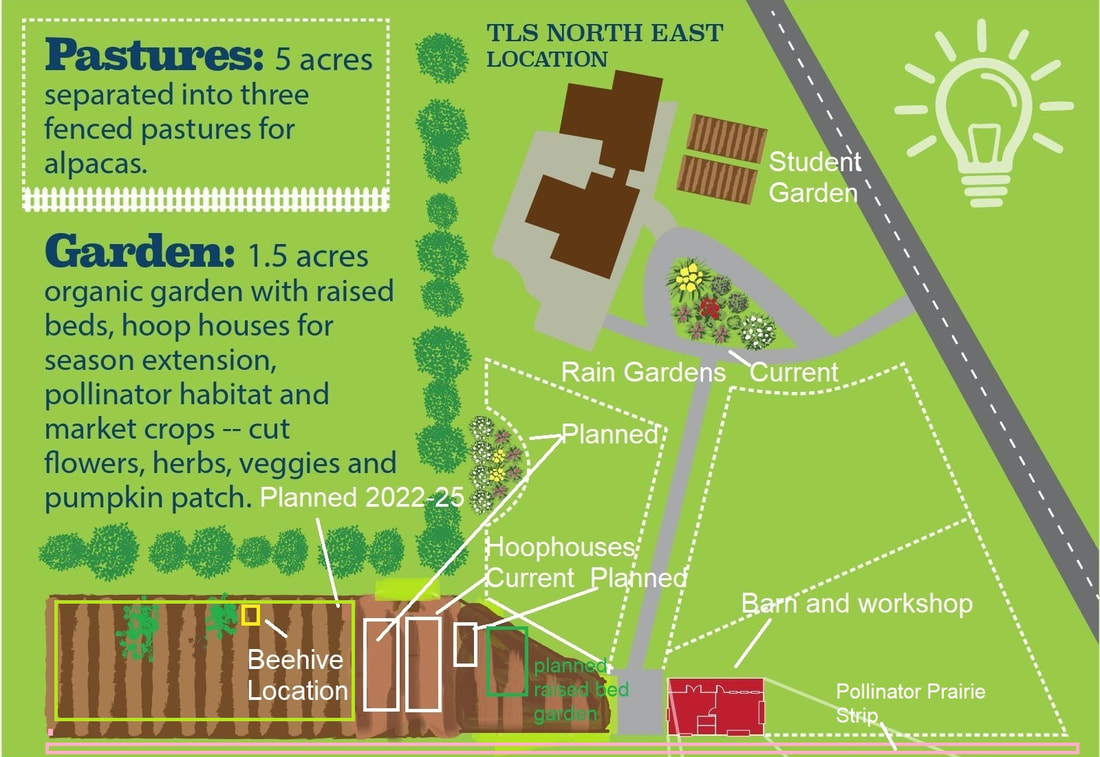In 2019, Learning 4 Life Farm partnered with TLS North East (located in Johnstown, Ohio) preK-12th grade students on the autism spectrum to build and plant two raised beds and six tire “planters” for a 300 square foot organic veggie, herb and flower garden and create a 3600 square foot rain garden incorporating Ohio native pollinator plants to help drain rainwater from the surrounding driveway loop.
Since then, the students have continued to “grow” the Learning 4 Life Farm garden, with help from staff, volunteers, local businesses and organizations. The vegetable and flower garden was expanded each year, and today our gardens include a 1200 square foot student garden with 17 4x8 foot raised beds and 22 tire/feed bin planters for vegetables, herbs, and flowers; an 3600 square ft rain garden with native pollinator plants and a vernal pool (home to frogs, butterflies, pollinator insects and the occasional hummingbird); and a 30x96 foot hoop house with 32 raised beds for year-round vegetables, herbs and flowers.
Students grow vegetables, herbs, cut flowers and perennial pollinator plants, including peppers, tomatoes, zucchini and summer squash, herbs, zinnias and echinacea. Our rain garden features native Ohio plants to create pollinator habitat, including butterfly weed, milkweed, rattlesnake master, bee balm, mountain mint, and brown-eyed susan.
Our gardens teach job & life skills and provide science education and informal horticultural therapy.
Since then, the students have continued to “grow” the Learning 4 Life Farm garden, with help from staff, volunteers, local businesses and organizations. The vegetable and flower garden was expanded each year, and today our gardens include a 1200 square foot student garden with 17 4x8 foot raised beds and 22 tire/feed bin planters for vegetables, herbs, and flowers; an 3600 square ft rain garden with native pollinator plants and a vernal pool (home to frogs, butterflies, pollinator insects and the occasional hummingbird); and a 30x96 foot hoop house with 32 raised beds for year-round vegetables, herbs and flowers.
Students grow vegetables, herbs, cut flowers and perennial pollinator plants, including peppers, tomatoes, zucchini and summer squash, herbs, zinnias and echinacea. Our rain garden features native Ohio plants to create pollinator habitat, including butterfly weed, milkweed, rattlesnake master, bee balm, mountain mint, and brown-eyed susan.
Our gardens teach job & life skills and provide science education and informal horticultural therapy.
Our 2022-23 gardens are expanding again! We will add a 20x30 foot heated hoop house to grow our own plant starts, two planned rain gardens (1800 & 2800 sq ft), and this fall we added a new 2275 sq ft raised bed edible and pollinator garden next to our barn and hoop houses. Students took home vegetables, herbs and flowers and sold them at an on-site farm stand.
Over the next few years we will expand further, adding a 1-acre market garden in the field behind our hoop house and expand prairie pollinator habitat into a 30-foot wide strip along our west three-acre perimeter.
Over the next few years we will expand further, adding a 1-acre market garden in the field behind our hoop house and expand prairie pollinator habitat into a 30-foot wide strip along our west three-acre perimeter.
Benefits of our gardening program:
Our gardens provide informal horticultural therapy for mental health, act as an outdoor classroom for sustainability, conservation and food source education for students on the autism spectrum; and serve as a transition job training site for students on the autism spectrum.
Gardening has been shown to decrease anxiety and stress in people on the autism spectrum, and we definitely see those positive effects in our students. Instructor and Autism Self-Advocate Sondra Williams reports that the garden “teaches the kids a hands-on skill and talent. They actively get to get their hands dirty and mess with the sensory stuff and be comfortable with that.” Says student Seth, "I love being outside in the garden. It's very relaxing and I can get some fresh air and contribute to working on the garden with the other classmates."
Our gardens provide informal horticultural therapy for mental health, act as an outdoor classroom for sustainability, conservation and food source education for students on the autism spectrum; and serve as a transition job training site for students on the autism spectrum.
Gardening has been shown to decrease anxiety and stress in people on the autism spectrum, and we definitely see those positive effects in our students. Instructor and Autism Self-Advocate Sondra Williams reports that the garden “teaches the kids a hands-on skill and talent. They actively get to get their hands dirty and mess with the sensory stuff and be comfortable with that.” Says student Seth, "I love being outside in the garden. It's very relaxing and I can get some fresh air and contribute to working on the garden with the other classmates."

